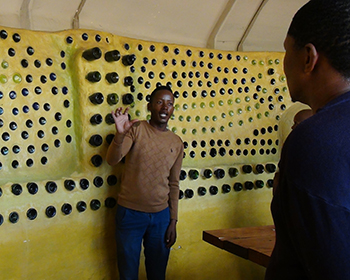Latest News Archive
Please select Category, Year, and then Month to display items
![]()
After South Africa’s battle with the record-breaking drought of 2015, Prof Andries Jordaan from our Disaster Management Training and Education Centre for Africa(DiMTEC) saw room for improvement in dealing with this kind of disaster.
Drought impact
Commercial farmers who are usually net exporters of food crops and communal farmers who own the bulk of the country’s livestock, were all hit hard in 2015. Most of the latter had no resources to spare as the drought progressed. The concern about the drought’s impact on the country’s food production and availability resulted in a joint goal of preventing food scarcity during future droughts.
Prof Jordaan’s visit to the National Drought Mitigation Center (NDMC) in Lincoln, Nebraska, in the US, several years ago prepared him to better equip communities in South Africa to deal with drought situations. “I recognised that in spite of the impact DiMTEC has been able to make on disaster preparedness, a gap remained in disaster response in South Africa.”
Sharing knowledge
In August this year Prof Jordaan again visited the NDMC. This time he requested a few key players in South Africa’s agriculture and disaster response communities to join him. With him were Janse Rabie, head of Natural Resources at AgriSA, a nonprofit organisation that functions as an interface between the government and about 28 000 South Africa farmers, and Moses Musiwale Khangale, director of Fire Services for the South African Ministry of Cooperative Governance and Traditional Affairs.
The South African delegation met with and learnt from climatologists, geospatial technologists, and outreach and planning analysts.
Eco-building workshop and rehabilitation through collaboration
2017-03-17

A demonstration of eco-building at Lebone Village
recreation centre
Photo: Supplied
An intimate learning platform was created when Velile Phantsi and Mokoena Maphalane, two community members who had received training in eco-building from the University of the Free State (UFS) Centre for Development Support (CDS) under the Faculty of Economic and Management Sciences, presented a workshop for 10 Free State psychiatric patients in Bloemfontein on 23 February 2017.
Building self-sustaining communities
The training programme took place at Lebone Village recreation centre, at a structure that was built through the eco-building initiative, Qala Phelang Tala (Start Living Green). The collaboration between the Department of Occupational Therapy at the Faculty of Health Sciences and CDS has the potential to address unemployment and housing backlogs and forms a significant part of the rehabilitation of vulnerable people. It has also created prospects for community-based research.
Training and support to rehabilitate vulnerable people
Following the sharing of skills, the Department of Occupational Therapy will continue to work with patients through this community engagement project. Trainees will receive support in building a recreation centre structure at their own complex. During the presentation Mokoena Maphalane shared his personal experience of how physical activity such as eco-building helped him recover from the debilitating effects of a stroke. It is something he hopes will assist other patients in the future.
More information on eco-building.